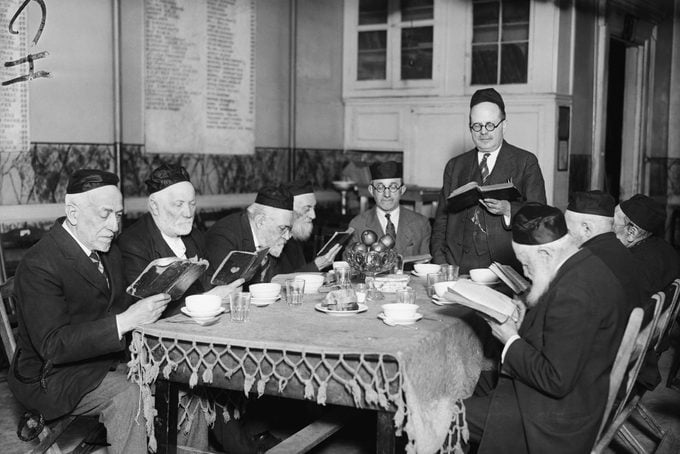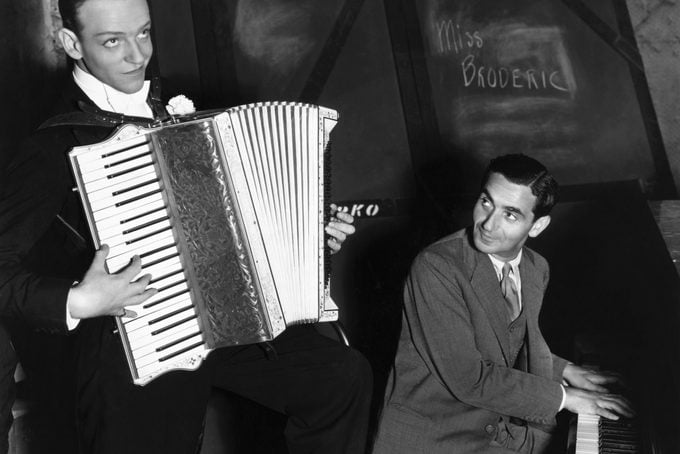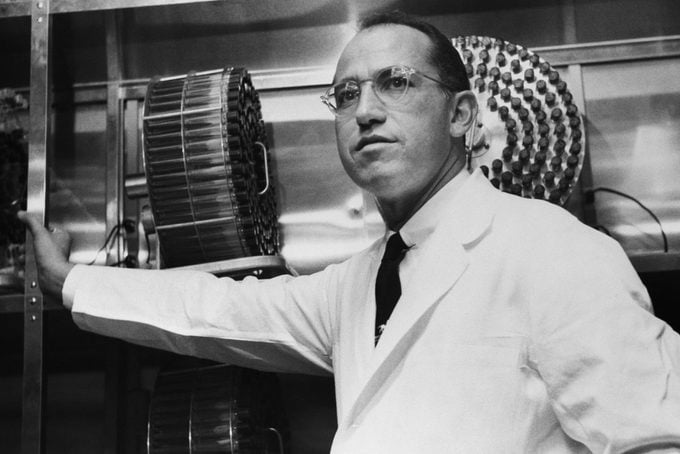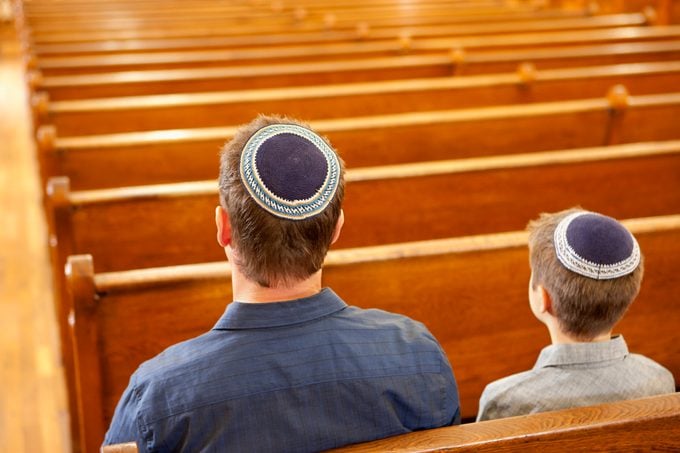What Is Jewish American Heritage Month? A Proud Jew Explains

I celebrate Jewish American heritage during the month of May—and you should too
The Jewish calendar is filled with well-known holidays—most people have heard of Hanukkah, Rosh Hashanah and Passover even if they don’t celebrate them. But every May, Jewish American Heritage Month invites people of all faiths and observance levels to celebrate in a different way. The holiday is all about acknowledging and celebrating the contributions Jewish Americans have made to this country.
“All of this is an antidote to antisemitism,” says Emily August, chief public engagement officer for the Weitzman National Museum of American Jewish History, which organizes the monthly holiday. That’s important, because there’s been an alarming increase in antisemitism in America (cases rose by 36% from 2021 to 2022) and internationally. With that in mind, the Foundation to Combat Antisemitism and the Weitzman National Museum of American Jewish History partnered on a monthlong campaign using the hashtag #StandUpToJewishHate to raise awareness of and stand up to antisemitism.
But the celebration goes beyond that. Jewish American Heritage Month is a way of inviting people to embrace all things Jewish in the most positive ways possible. It centers on our cuisine and our major contributions to science, law, tech, literature and, yes, the movie industry. “Jewish Heritage Month is about history, culture and knowledge,” says historian Miriam Mora, PhD, director of academic and public programs at the Center for Jewish History.
As for me, I have always been proudly Jewish, if not vocally or visibly Jewish. My faith and observance, though deeply ingrained, were mostly shared with family and friends. But as the child and grandchild of Holocaust survivors in a world tainted by antisemitism, I feel that I must speak up and speak out often about my Jewishness. Where it once felt like a responsibility, it now feels like an honor to share my love and great pride in Judaism. One of my role models in all things Jewish pride, Ambassador Deborah Lipstadt, special envoy to monitor and combat antisemitism for the U.S. Department of State, mentioned something in a Zoom meeting for female chaplains that stuck with me. She said that no matter where she travels in the world, even throughout the Middle East, she proudly wears her Jewish Star (aka the Magen David or Shield of David) necklace. Inspired by Ambassador Lipstadt, I do too.
Get Reader’s Digest’s Read Up newsletter for humor, cleaning, travel, tech and fun facts all week long.
When is Jewish American Heritage Month?
Mark your calendar! This holiday is celebrated throughout the month of May each year. It may not have as long a history as some other Jewish holidays, but it’s far from a new celebration. “Jewish American History Month has been celebrated formally since May 2006, following the 2004 events recognizing 350 years of a Jewish presence in America,” says Mora.
While we know that President George W. Bush established the national holiday in 2006, we’re less clear on the significance of the month. No one seems quite sure why May was chosen for the celebration. Perhaps it had to do with the fact that it’s easier to go to events or lectures during the springtime. Or maybe it was related to the Jewish calendar—May is a relatively quiet time of year in terms of traditional holiday observances.
Jewish American Heritage Month is far from the only monthlong celebration of a culture or faith. In fact, Asian American and Pacific Islander Heritage Month is also celebrated in May. “The United States recognizes several heritage and history months as celebrations of the diversity of the American mosaic,” says Mora.
What is Jewish American Heritage Month?
“Jewish Heritage Month acknowledges the distinctive contributions Jewish people have made to this country that welcomed so many of us when we had nowhere else to go,” says actress Mayim Bialik. “This country is where my grandparents arrived with very little in their possession except the hope for something better.”
The Jewish American Heritage Month statement is straightforward: It not only focuses on preserving, celebrating and educating the public about Jewish people’s contributions to broader American culture but also explores how America has shaped the culture and the gratitude of the Jewish community, says August. It plays out in the form of outreach programs, entertainment, food festivals and other events centered on the collective contribution Jews have made to American life.
Our impact on the United States has been far-reaching. It’s estimated that Jews make up only 2.5% of society. But while we’re a small percentage of the population, our contributions have been significant, touching every industry and cultural pursuit.
The Great American Songbook would not exist without Jewish composers Irving Berlin, Aaron Copland, George Gershwin and Leonard Bernstein. Jewish doctor Jonas Salk developed the polio vaccine and changed the face of immunology. Computer science and engineering pioneer Harold Abelson is founding director of Creative Commons and the Free Software Foundation, while Sergey Brin co-founded Google.
Photographers Diane Arbus and Richard Avedon changed the way we look at the world. Scarlett Johansson, Lenny Kravitz, Adam Levine, Natasha Lyonne, Lisa Kudrow, Daveed Diggs and countless other entertainers are all Jewish. Bob Dylan (born Robert Zimmerman) changed the face of American folk music, while my fellow Brooklyn homegirl, the late great Ruth Bader Ginsburg, fought for gender equity and became the second female justice of the U.S. Supreme Court.
So what’s worth celebrating? “Anything that raises the profile of the rich and diverse nature of Jewish American culture is valuable,” says Malka Z. Simkovich, PhD, the Crown-Ryan chair of Jewish studies at Catholic Theological Union in Chicago.
Why do we celebrate Jewish American Heritage Month?
During Jewish American Heritage Month, we get the opportunity to highlight the way in which Jews have changed the country for the better. The holiday is also a way of fighting antisemitic tropes by reframing the narrative.
“Some people use our contributions as a way of fueling antisemitism,” says Max Coën, the incoming business development lead for the Israeli Ministry of Economy’s Economic Mission to the East Coast. “The truth is that we have had our hands in a lot of things … in some ways disproportionate to our size. And people are apologetic about it.”
Instead, it should be a great source of pride for everyone. “They should believe they can have an effect on culture and science and history,” Coën says. “And being a Jew doesn’t limit us. It can be a driving force to inspire others to mimic that success.”
Bialik agrees. “The Jewish people have added a tremendous amount to our culture in so many fields, and besides the notion that ‘Jews run Hollywood’ or ‘Jews run the banks’—neither of which is true!—our contributions to many fields are significant and deserving of acknowledgment,” she says. “I am a proud American and a proud member of the Jewish people, and I wish my grandparents were alive to witness this month in all its enthusiasm. I’m grateful my sons are able to experience it, especially in a time in our American and global history when being Jewish is a source of conflict and hatred. There is much to celebrate!”
As for me? To be honest, I never thought I needed a month to celebrate my people and history. But in learning more about Jewish American Heritage Month, I see how important it is to commemorate who we are and what we’ve accomplished and contributed. “Jews continue to be the ‘other’ in spite of our more than 350-year presence,” Mora says. “Simply by self-identifying as Jews, Jews make a statement: ‘I am here.'”
Do other countries celebrate Jewish Heritage Month?
The celebration of Jewish heritage isn’t unique to the United States. It’s recognized elsewhere in the world, most notably in Canada. “The Jewish community in Canada, much like in the United States, has a long history of migration, acculturation and contributions to Canadian history and is all too often left out of the broader American Jewish story,” Mora says.
Like their American counterparts, Canadians celebrate this national holiday during the month of May.
How to observe Jewish American Heritage Month
Just as every family puts their own spin on holidays—consider the various Hanukkah traditions and Rosh Hashanah traditions—everyone celebrates Jewish American Heritage Month differently. If you’re looking for some inspiration, I compiled a list to get you started.
Research your own Jewish story
If you’re curious about your heritage, Mora suggests taking steps to “discover your own American migration story.” She notes that the Center for Jewish History is home to the Ackman & Ziff Family Genealogy Institute and the DNA Reunion Project. You can reach out to the staff, make an in-person appointment or attend an online class. It’s a great option even if you’re not practicing or otherwise involved with your personal Jewish history
Seek out diversity
There is no single country, culture or origin story when it comes to being Jewish. We come from all over the world and every racial designation. Discover Black Jews, Sephardic food and music, or ways to celebrate that are out of your typical comfort zone.
Listen to an older relative’s stories
I’m the child and grandchild of Holocaust survivors, and so many of my family’s stories have been lost permanently. We don’t have medical records, and until earlier this year, I had no remaining photographs of my father as a child. If there’s one thing I know, it’s that personal history is powerful.
Honor your history by visiting a great aunt or other relatives, and really listen to them. You’d be amazed by just how powerful their stories can be.
That’s something neither I nor my family take for granted. My sister Kiki is currently creating a video series of talks with American-based Holocaust survivors about their lives after tragedy. There’s so much emphasis on the suffering these people have faced, but my sister is chronicling the joy and resilience they’ve found in America.
Host a Jewish book club
Gather fellow bookworms to read books that are important to the Jewish population, and don’t just stick to Holocaust books. Read widely! August recommends choosing books by Jewish authors or on Jewish topics.
Connect with modern Judaism
“Sometimes people who are not living in the Jewish community might think about Jews through the lens of history,” says Simkovich. Their minds may turn to the Holocaust, the first century or the Jews of the past. What she asks is that “anyone interested in celebrating this month would make a proactive effort to encounter living Judaism, whether sharing a Shabbat or going to a Jewish neighbor or cultivating a friendship that brings you to the current living Judaism. I think that’s more effective than reading a history book.”
Create your own heritage project
Alan Locher, host of The Locher Room YouTube show, is the child of two Holocaust survivors. But it was only during his late 20s that he started to strongly identify with his Jewish heritage. In 1996, he traveled with his parents to Holland (both of them were born and raised in Amsterdam) to meet the family who hid his mother during World War II.
Still, his heritage didn’t intersect with his work until recently. During the pandemic, Locher—who has a long history of working with daytime and prime-time actors—started interviewing people via his YouTube channel to cheer them up. But when he noticed the disturbing increase in antisemitism, he started to focus his interviews on people standing up to hate.
“My belief is that conversations like this can change hearts and minds,” he says. “We all must do everything we can to stop hate in all its forms.” If you think that you have a unique way of combating hate in this country, consider starting your own channel or recording your personal experiences.
Support a Jewish business
Carlos Huber, a fragrance designer and founder of Arquiste, was born in Mexico but currently considers New York his home. Huber describes his upbringing as including a mix of Sephardic heritage (by way of Istanbul and Greece) and Ashkenazi (by way of Poland and Lithuania). He channeled that mix into L’Etrog cologne, which celebrates both his heritage and the Jewish holiday of Sukkot, during which a citron fruit plays a major role.
That’s just one example of the many Jewish-owned businesses in the country. By shopping at one of these stores, you’re putting money in the hands of the community instead of giant corporations.
Enjoy Jewish experiences
Make a Jewish recipe, go to a Jewish bakery, listen to some Jewish music—whatever moves you. There are no rules or ideals to the observation of this holiday. It’s just a way to speak up proudly or reclaim a part of yourself that you may have lost.
Take to social media
Whether or not you consider yourself a social media influencer, your posts matter. Talk about Jewish American Heritage Month and the Jewish role models who inspire you most.
What Jewish American Heritage Month means to me
I celebrate every single Jewish holiday—and I’m not kidding! I even celebrate the ones no one has ever heard about. So I initially figured I could take a pass at celebrating Jewish American Heritage Month.
But the fact is that culturally, we’re combating a loneliness epidemic and still finding our footing after the pandemic. In addition to being a journalist and author, I’m also a certified chaplain. And that means I’m going to try to find ways to help even unaffiliated or uninterested Jews reclaim some pride in their faith this month, even if it means treating them to some kugel or kokosh cake (a Hungarian chocolate roll loaf). Connecting with others, be they fellow members of the faith or allies, is perhaps the greatest testament to being proudly Jewish.
My late father, David, was a child slave laborer to the Nazis before he was sent to a concentration camp. He was persecuted as a small boy for the crime of being Jewish. I will honor him by finding ways to commemorate my faith this month, and I really hope you’ll join me.
Sources:
- Miriam Mora, PhD, director of academic and public programs at the Center for Jewish History
- Emily August, chief public engagement officer for the Weitzman National Museum of American Jewish History
- Malka Z. Simkovich, PhD, Crown-Ryan chair of Jewish studies at Catholic Theological Union in Chicago
- Max Coën, incoming business development lead for the Israeli Ministry of Economy’s Economic Mission to the East Coast
- Alan Locher, host of The Locher Room and Conversations with Alan
- Carlos Huber, fragrance designer and founder of Arquiste
- Anti-Defamation League: “Audit of Antisemitic Incidents 2022”












